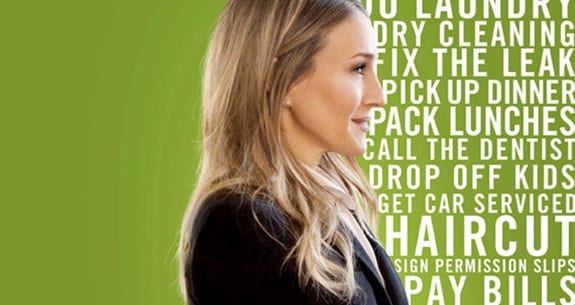 The day the movie version of Allison Pearson’s 2002 best-seller, I Don’t Know How She Does It hit our neighborhood theatre, I insisted my husband go with me.
The day the movie version of Allison Pearson’s 2002 best-seller, I Don’t Know How She Does It hit our neighborhood theatre, I insisted my husband go with me.
He had 10 other movies on his list above this one. But I was adamant. The book had inspired my own anthology, Mommy Wars. I wasn’t going to miss opening night. To my surprise, Saturday at 7 pm, the theatre was half full. I couldn’t figure it out. The book had been a bestseller. Where were all the moms who’d made it one?
Then it hit me. Duh. The Muffia were busy. Putting toddlers to bed. Accomodating husbands who balked at a chic flick. Collapsed on the sofa after an intense week juggling work, babies, pets, laundry and “having it all.”
I missed my fellow moms. I laughed extra loud at every punch line to make up for their absence. I whispered a little thank you to the universe that I had managed to sneak away, that I had survived motherhood to this exquisite stage when my 14, 13 and 9 year old kids can stay home on Saturday nights without a sitter.
I loved the movie. Loved Sarah Jessica Parker, who plays Allison Pearson’s maniacally stressed working mom heroine. Loved her messy, roots-showing hair, often crawling with lice. That’s what kids do to us moms; like the Velveteen Rabbit, our worn edges show how deeply we adore our charges.
I loved how much Kate Reddy loved her job, and how good at it she was. Loved her dishonesty – her lies to her boss about why she was late to the office, her distressed-pie deception of the stay-at-home moms at the school bake sale – and the disarming candor she shared with her dearest friends. I loved her kitchen, especially its huge butcher block island covered with kids’ art, rotten fruit, dull pencils, broken pens, and endless lists of stuff Kate needs to get done. Like the Velveteen Rabbit, Kate was real.
The only thing I didn’t love?
The changes that Hollywood writers made to her husband.
In the book, he’s a sweet-on-the-surface, clueless-underneath “Darling Husband.” Richard is focused on his career, his self-esteem (he cringes when his wife is described as the “main breadwinner’), his need to leave early for week and stay late for client meetings, and his desire to maximize sex opportunities with his hygiene-deficient, sleep-deprived, stressball of a life partner. He’s a guy who could help his wife immeasurably by devoting an hour more a day to the kids and the household and her — who just doesn’t.
I know five billion dads just like him. Including my own DH. Lovely men who do less than zero to help us working moms hold onto our hard-won dreams of combining careers and kids. Ambitious men who marry similarly ambitious women and feign bafflement when asked to split the late nights at work and daycare pick up.
Men who book client dinners and business trips without checking their spouses’ travel commitments. Men who leave the house at 6 am every day to work out before the office, because in order to be good dads they need to manage their stress levels. Men who say “we” when they mean you, as in “What did we get my mother for Christmas this year?”
Men who assume that using birth control, memorizing the pediatrician’s number, buying all birthday presents, trimming the kids’ toenails, taking the pets to the vet, responding to 4:48 am nightmare screams, and hiring childcare providers are designated female territory. Men who are a primary factor in why so many talented, motivated, well-educated women leave the workforce for good once they become mothers. Avoidant, clueless husbands like Kate Redding’s force a Sophie’s Choice upon their wives: work or kids? Or, in more elaborate terms, hire shifts of 2-3 nannies to raise the family, or abandon 30 years of education, work accomplishments and economic independence so at least one non-stranger will actually be with our children more than an hour a day?
One of the most gratifying gifts of the original version of I Don’t Know How She Does It was realizing that other driven, career-oriented wives like me love, and struggle with, the same kind of husband I landed.
Disappointing then that the movie-dad is a sweet, impoverished, disheveled husband who helps with diapers, meals, school pick-up and grocery shopping; likes sex but doesn’t pressure Kate when she’s exhausted; and never complains about anything. The perfect man. I’ve never met one of those in real life.
Many movie scripts alter plots and characters. With good reason – to simplify a story line, to make the drama zip along, to avoid a complex character who takes too much screen time to decode. But why would the director make Kate Reddy’s husband less real than he was in the novel? Perhaps the movie marketers figured “we” – this time, I mean our husbands – couldn’t handle seeing the truth up there on the big screen.
But by glossing over a realistic portrayal of many working women’s partners – husbands who do far less than 50% of household and childcare chores – the movie shortchanges women’s valiant, often comical efforts to achieve “balance.” It gives these men yet another societal pass. It dodges an opportunity to validate women’s frustrations and enlighten men about how difficult it is to juggle work and family when you live life as a single mom, even though you have a husband who sleeps right next to you each night.
Reality bites. But what cuts even deeper? Lack of reality. Denial of reality. That can really drive you crazy.





